Orientation 2025: Georgetown Law Welcomes 1,000+ New ‘Hoya Lawyas’
August 25, 2025
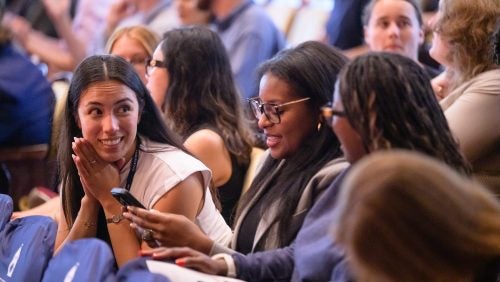
New students eagerly anticipating the 2025 Faculty Moot, one of the highlights of each year’s orientation week.
Some 670 new J.D. students and 400 LL.M. and graduate students began their Georgetown Law journeys last week. Orientation, which began August 18, offered welcome activities, classroom introductions, social gatherings and excursions that brought campus back to life after the quiet days of summer.
This year’s admissions cycle was historically competitive, with new J.D. students selected from a pool of nearly 14,000 applicants — the second-largest number of applications ever received. The 1Ls hail from 43 U.S. states and 16 different countries. One in ten are first-generation college graduates. The Evening Program, whose students pursue law degrees while holding down jobs during business hours, welcomed 80 new students, the highest number in 15 years. The entering class also includes a record 40 military members and veterans, double the number that began a year ago. The LL.M. cohort includes individuals from at least 50 different countries around the world and who speak 39 different languages.
“Law school is a profound and, at times, challenging journey. It demands a lot from you, intellectually, emotionally, ethically. But it also offers a lot in return: new ways of thinking and the ability to change lives,” Interim Dean Joshua C. Teitelbaum advised the new students during his welcome address. “At Georgetown Law, we believe that the law is not just a tool for resolving disputes, but a means to shape society, to protect rights, to challenge injustices and to serve the common good.”
Exploring the nation’s capital
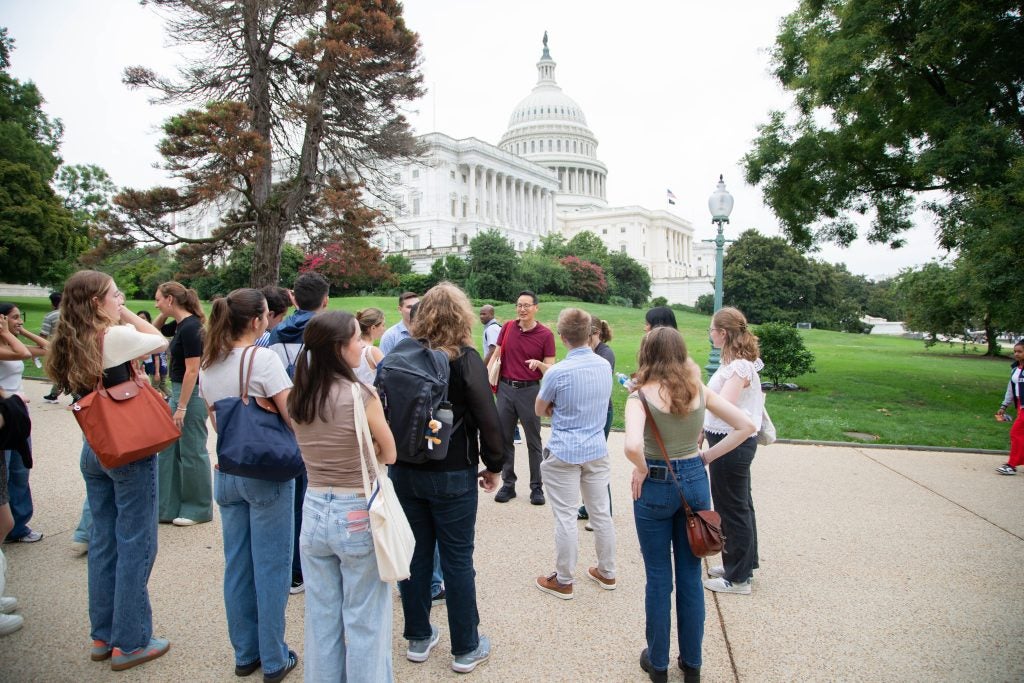
Alumnus and current Librarian of the Supreme Court David Mao, L’93, led a walking tour of nearby landmarks like the U.S. Capitol Building.
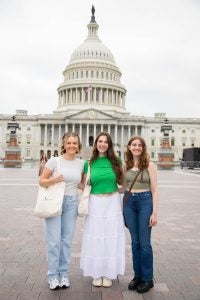
Mackinzie Hudmon (left), L’28, and Ella Brown (center), L’28, said the tour inspired them to use the Library of Congress reading rooms as study spaces. “If we’re here, let’s use it,” Brown said.
Orientation week kicked off with a series of city tours near campus, including a morning jog along the National Mall; a behind-the-scenes look at Microsoft hosted by Head of IP Strategy, Licensing and Acquisition and Adjunct Professor Alonzo Barber, L’06; a reflective campus and neighborhood tour led by members of the Capitol Campus and Law Center ministry teams; and a visit to the nearby Capital Jewish Museum with Jewish Chaplain Michael Goldman, L’69.
Nearly 30 students joined Librarian of the Supreme Court of the United States David Mao, L’93, for a walking tour of Capitol Hill’s most iconic and recognizable landmarks, including the Capitol building, the Library of Congress and the U.S. Supreme Court.
For many, it was a reminder of the proximity between campus and the places where the nation’s laws are made. “Part of being law students is being really up-to-date on what’s going on,” said Mackinzie Hudmon, L’28. “It’s right here in our backyard.”
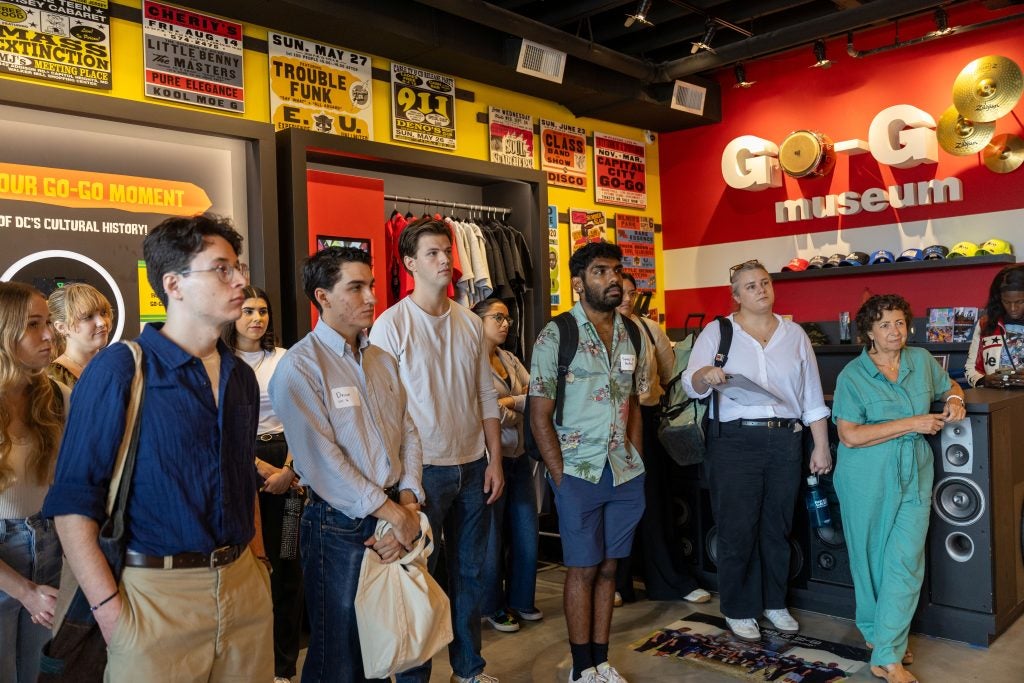
Students traveled to the nearby Anacostia neighborhood for a tour of the Go-Go Museum, which opened in February.
New this year was a tour of the Go-Go Museum & Café led by faculty and staff from the Human Rights Institute. During a guided tour, students explored the cultural and political significance of go-go (a local spin on funk music) and the genre’s impact on community organizing and local activism in Washington, D.C.
“It was an awesome way to connect with the local community,” said Senthil Meyyappan, L’28, following the tour. “Something that I think was really cool to learn about was just how connected go-go music was to public policy [and] the city of D.C.”
For tour participant Cas Cater, L’28, the tour was also a reminder of the role of lawyers in giving back to their communities. “My parents are Cuban and so I love to hear about the Afro-Latino community’s impact on go-go music,” she said. “That’s why we’re here ultimately as future lawyers, to help the communities that we come from.”
Learning to think like lawyers
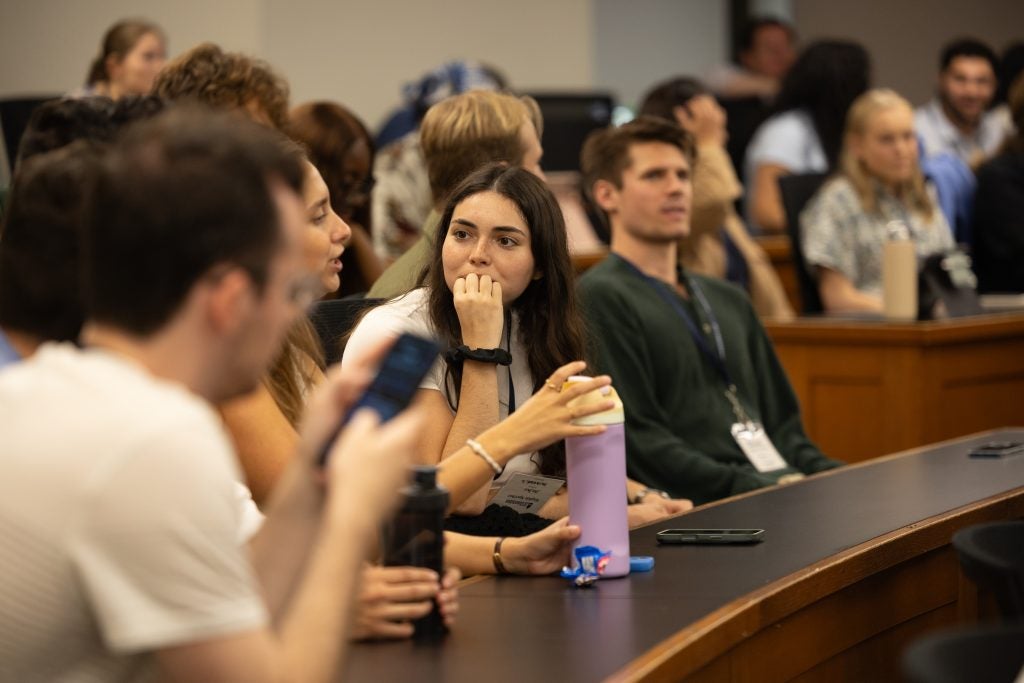
New classmates introduced themselves during a welcome session for Georgetown Law’s Section 3. “That’s what really drew me to Georgetown,” said Riley Herbert, L’28, of Section 3’s alternative 1L curriculum. “You get to figure out the foundation of the law instead of just rotely learning it.”
In addition to forging connections with classmates at section-specific welcomes and “Introduction to the First-Year Experience” class sessions, students had the chance to hear faculty experts discuss headline-grabbing legal issues such as U.S. asylum law and artificial intelligence (AI) during a series of faculty talks held on Tuesday, August 19.
“I feel very grateful that before classes have even started I have access to such brilliant professors and experts in the field,” said Sheridan Ameo, L’28, who attended the talk “Exploring the Frontier of Generative AI’s Legal Landscape” with Professor Paul Ohm. “I am so excited to start classes.”
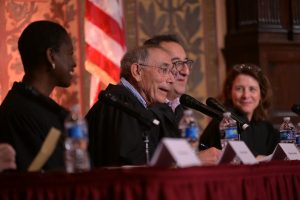
Participants on the panel of “justices” at the faculty moot included (L-R): Professors Goodwin, Gornstein and Lederman and SCI Director Shrager
For many, the chance to witness oral arguments in person during the Faculty Moot Court proved a much-anticipated highlight of the week. “The fact that they’re doing a highly public case is going to be really cool,” said Grant Goodyear, L’28, in advance of Thursday’s event.
On August 21, incoming students gathered on the historic Hilltop Campus to watch Professor Stephanie Barclay represent the petitioner and Professor Michael Gottesman represent the respondent in Chiles v. Salazar, a case to be heard by the U.S. Supreme Court this fall concerning whether a Colorado ban on conversion therapy violates the Free Speech Clause of the First Amendment.
Barclay and Gottesman delivered opening statements and fielded questions from a panel of “justices” that included Professor Michele Goodwin, Professor Paul Smith, Professor Martin Lederman, Supreme Court Institute (SCI) Executive Director and Professor from Practice Irv Gornstein and SCI Director Debbie Shrager.
“More than a performance, a moot is a window into the role lawyers play in shaping the law and, by extension, upholding the rule of law itself,” Teitelbaum said in his introductory remarks. “The rule of law is the foundation of our democracy. And in times of instability or injustice, it is lawyers, and future lawyers like you, who must defend it.”
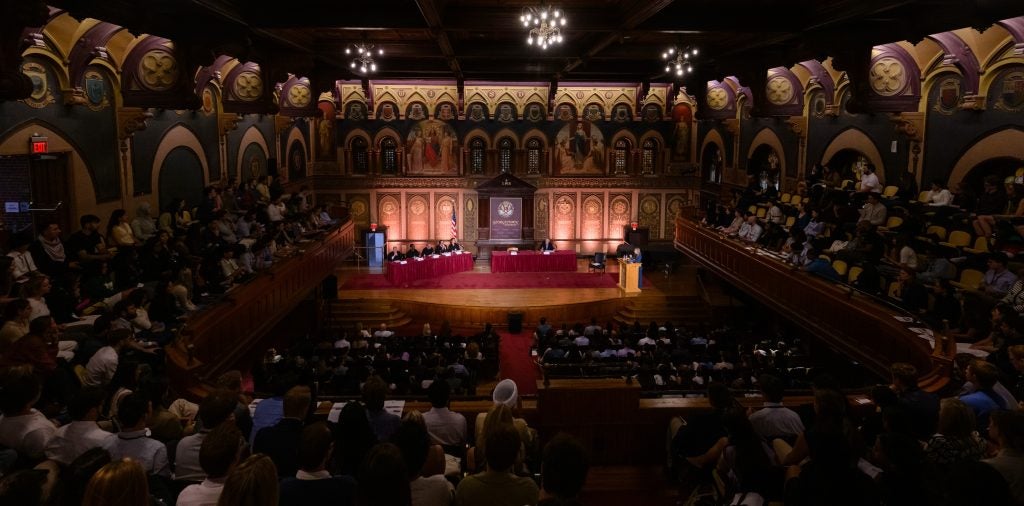
It was a full house in Georgetown’s ornate Gaston Hall to watch the Faculty Moot.
Navigating the “twists and turns” of law school
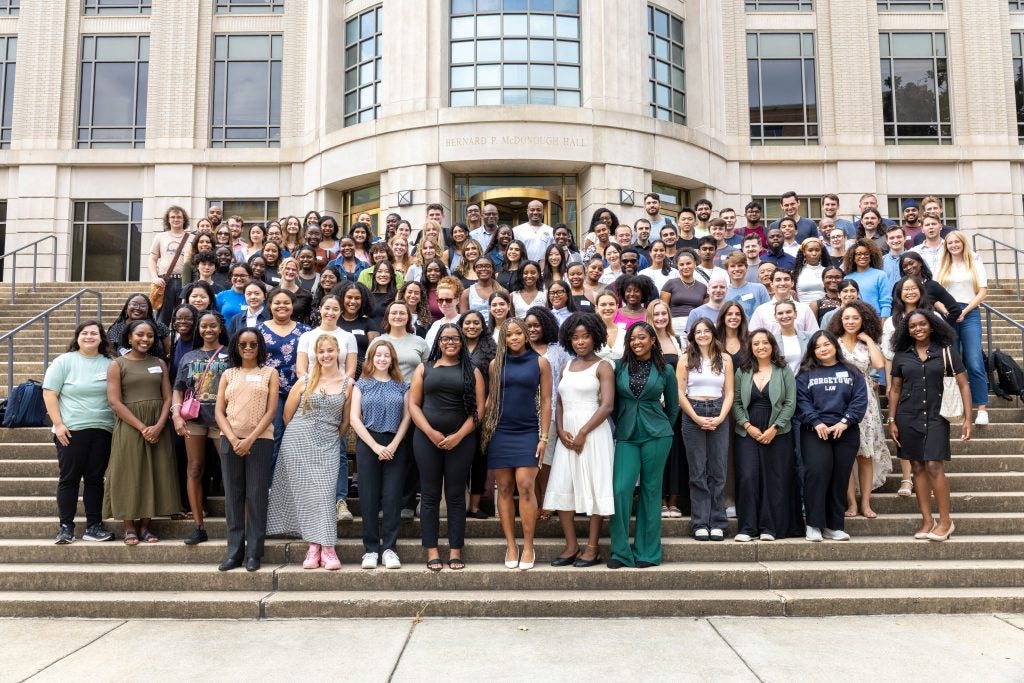
RISE students posed for a photo on the steps of McDonough Hall during pre-orientation week. This year’s RISE cohort is the program’s largest ever.
130 J.D. students also participated in a pre-orientation week organized by RISE, the Law Center’s program for students who may have had less exposure to the legal profession before applying to law school. The schedule for the program’s largest cohort to date included mock classes and exams, a welcome reception and group dinner and information sessions on topics such as career planning and networking.
Khadia A. Okai-Koi, L ’28, who grew up in New York City but went to college in Ghana, said she enrolled in the RISE program to meet others who were first-generation college graduates and had taken nontraditional paths to law school. “No one in my family is a lawyer and my only exposure was the TV shows ‘Suits’ and ‘How to Get Away with Murder,’” she said.
So far the program has more than fulfilled its promise. “RISE has made me feel at home at Georgetown,” said Okai-Koi, who was moved when her new RISE friends threw her a surprise birthday party. “I had no idea the law school community would be full of people I could relate to immediately and that there would be so many supportive students ready and willing to guide you. It’s been a transformative experience and has made me much more at ease and excited going into law school.”
Zeeshan Bhatti, L’28, said he’d decided to apply to RISE because of his “trepidation” about being back in a classroom for the first time since finishing his MBA in 2006. Originally from Pakistan and the first in his family to graduate from college, he didn’t know what law school might be like. But after the RISE week, he was feeling much more confident.
“The program was super comprehensive – we covered everything, career stuff and personality and mental health, and I met a lot of incredible people, but for me the most helpful thing was that we had a mock class and at the end of the week we had a mock exam,” said Bhatti of getting a preview of the Evidence course taught by Adjunct Professor Mushtaq Gunja. “We’d all heard about ‘cold calling’ and how intimidating a class can be – I was terrified! But the class was so fun, and being in a real classroom really helped me calm down. I feel so better prepared.”
Throughout both the RISE pre-orientation and the official orientation week for J.D. and LL.M. students, campus leaders not only introduced the building blocks of legal reasoning, but also encouraged the newcomers to reflect on the strategies and skills that will help them succeed both inside and outside the classroom — from time management and study techniques to the importance of building relationships with fellow students and the broader Georgetown Law community.
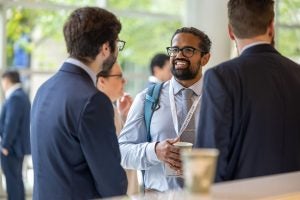
Graduate and LL.M. students gathered for a welcome reception and lunch that featured remarks by Interim Dean Teitelbaum.
“Before we even set foot on campus, we’ve already been so welcomed and made to feel like such a big part of the community here, and that’s priceless,” said LL.M. student and Filipino lawyer Mateo Tomas Lopez Escueta, L’26, following a welcome reception and lunch for graduate students. As the first lawyer in his family, the chance to pursue studies in international law and international arbitration at Georgetown Law is a “once-in-a-lifetime opportunity,” Escueta said.
“Washington, D.C. is where everything is happening — policy gets made here,” reflected Technology Law & Policy LL.M. student Nancy Imadi, L’26, who works in banking regulation and policy in Ghana. “I’m a mother of three. I have two young girls and a boy. And I want to be an example for my girls especially, to see that you can still pursue your dreams no matter what age that you are.”
At “JD Careers: Support from the Start,” a series of panel discussions organized by the Office of Career Strategy (OCS) and Office of Public Interest and Community Service (OPICS), entering students had the chance to hear from distinguished alumni with careers spanning public service and the private sector, including work in transactional law, litigation, government, academia and non-profits.
Panelists Michael F. Williams, F’98, L’01; Miriam Vogel, L’01; Justin Hansford, L’07; and David S. Sanders, L’95, reflected on the “twists and turns” of their law school experiences and careers and offered advice to the incoming students about academic and career success — including the importance of making connections with classmates and alumni in the years to come.
“Each class you take will be useful,” Vogel said. “You are constantly learning. Know that all of it will be put to good use.”
“This is the ultimate profession where what you put into it is what you get out,” agreed Sanders. “You don’t have to be disagreeable to disagree with someone. If you can be smart, authentic — things happen.”
That advice was echoed during “What I Wish I Knew,” a series of breakout sessions organized by the Office of Student Life (OSL) in which 2L and 3L peer advisors offered candid advice about the law school experience, courses and campus activities such as journals and affinity groups as well as experiential opportunities like clinics, externships and clerkships.
“Don’t ever sell yourself short,” urged Jen Fridman, L’26. “Everything you do should be geared to making you a happier, better, more well-rounded person, because your time is so precious now.”